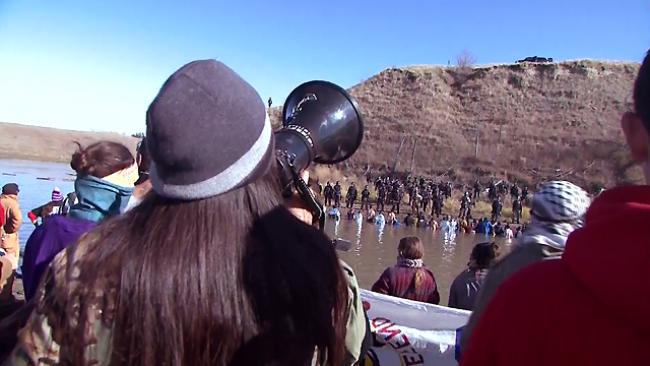Articles Menu

At least 13 demonstrators from Canada, including five from British Columbia, have so far been arrested for “illegal protest activity” related to a Native American-led movement aimed at stopping construction of a pipeline through North Dakota, according to statistics released by the Morton County Sherriff’s Department.
A total of 438 people have been arrested since August in relation to the ongoing movement against the Dakota Access Pipeline LLC construction in North Dakota, according to the Sheriff’s Department.
Click here for a full timeline of the conflict at Standing Rock
The arrested demonstrators come from 43 states, Washington D.C. and Canada, revealing the breadth of support for the Standing Rock Sioux Tribe, which is hosting a large camp on its reservation, in its battle against the pipeline which it says poses a threat to the area’s water supply and has led to the destruction of burial grounds and sacred sites.
The Standing Rock Sioux also have deep support among First Nation communities in Canada. Many First Nation leaders have travelled and continue to travel to Standing Rock.
Five individuals from Canada were arrested on Oct. 27, the day when state and county police, along with National Guard troops, moved with force against the demonstrators, known as water protectors, who had been launching rolling blockades in an effort to slow down pipeline construction, according to the Sheriff’s Department’s stats.
All those arrested from Canada that day were charged with “maintaining public nuisance.”
Four of the five arrested were also charged with “engaging in a riot” and “conspiracy to endanger by fire.”
The Oct. 27 arrests do not include a reference to a home province.
The Sheriff’s Department’s stats show four demonstrators from British Columbia were arrested on Oct. 22 and charged with “criminal trespass” and “engaging in a riot.”
A fifth individual from B.C. and another from Alberta were arrested on Oct. 10 and charged with the same, according to the stats.
On Sept. 14, two demonstrators from Canada, one from Saskatchewan and another from the Northwest Territories, were arrested and charged with “criminal trespass” and “conspiracy to obstruct government function.”
People who have faced police action on the frontline say they’ve been put into cages resembling dog kennels once they’ve been arrested.
Police, backed by Humvees and armoured personnel carriers, have also used sound cannons, bean-bag rounds, pepper spray and tear gas against unarmed demonstrators.
The Standing Rock Tribe has called for prayer and peaceful resistance on the frontlines of the demonstrations.
The National Congress of American Indians, which resembles the Assembly of First Nations in Canada, has called the actions of law enforcement against the demonstrators as “shocking.” The congress called on the Department of Justice to step in after the events of Oct. 27 which saw over 100 people arrested.
“The NCAI community is at a loss trying to grasp the events of (Oct. 27’s) attack on protectors gathered to defend water rights, lands, and sacred places. We are working closely with the Standing Rock Sioux Tribe as they strive for peace during this difficult time,” said the congress in a statement. “We will not stand for the continued violation of our First Amendment rights and Tribal Sovereign rights. Enough is enough.”
Only one demonstrator has been arrested with a firearm throughout the months-long conflict. Red Fawn Fallis was charged with attempted murder after she was arrested on Oct. 27. Fallis allegedly fired a .38 revolver as she struggled with two police officers. The bullets were fired into the dirt near an officer’s knee.
The Morton County Sheriff’s Department says law enforcement is trying to keep demonstrators off private lands owned by DAPL for its pipeline construction.
The Standing Rock Sioux say the lands are part of its treaty territory.
Once built, the $3.78 billion oil pipeline will pump about 500,000 barrel of oil per day from the Bakken shale fields in North Dakota through South Dakota and Iowa to Illinois where it will connect with existing energy infrastructure.